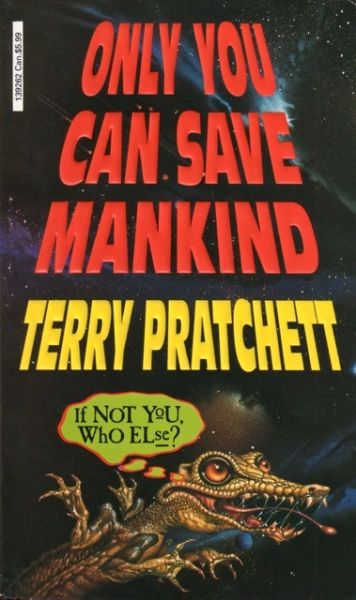To Reach the Unreachable Star
Only You Can Save Mankind (Johnny Maxwell, volume 1)
By Terry Pratchett

26 Nov, 2020
1992’s Only You Can Save Mankind is the first volume in Terry Pratchett’s Johnny Maxwell trilogy.
The grim tyranny of Margaret Thatcher was succeeded by the slightly less onerous rule of her former lackey John Major. Not that this concerned Johnny Maxwell, who was young enough to avoid most unpleasant world news. But his youthful innocence cannot protect him from the reality that his parents are on the verge of divorce nor from the fact neither parent seems up to the task of parenting him.
At least the same technological progress that allows the British government to whimsically snuff out lives half a planet away has also allowed young Johnny the distraction of computer games.
If only his video enemies would stop trying to talk to him.
Computer games are meant to be cathartic. Fire up the computer, start the game, and massacre as many faceless foes as it takes to forget everyday woes. In the case of Qobi Software’s Only You Can Save Mankind, the enemy is the rapacious ScreeWee Empire. Johnny is doing his part — blasting as many ScreeWee ships as he can before his inevitable demise at the manipulating limbs of the aliens — but the ScreeWee are not doing theirs. Lately, they’ve taken to offering surrender.
What the ScreeWee know but Johnny does not is that gamespace the ScreeWee fleet occupies is filled with the relics of long-vanished civilizations. These are the only remains of the antagonists of now outmoded computer games. Now it is the ScreeWee’s turn to follow in their predecessor’s footsteps. Unfortunately, those footsteps lead to mass extinction.
Johnny does the remarkable: he listens to the ScreeWee pleas. He is, however, just one player among many. Nevertheless, Johnny will do his best to see the fleet to the Border, beyond which they might find a new homeworld.
Unfortunately for the ScreeWee, at least one senior officer is a traditionalist who prefers noble extinction over disgraceful survival.
~oOo~
It’s weird that I think of this as early Pratchett when I don’t think of Lords and Ladies (the Pratchett published immediately before Only You) or Small Gods (the Pratchett immediately after Only You) as early. In a chronological sense, all three are early-ish, published about twenty years into Pratchett’s forty-five-year career. Looked at as output, they place in the first third of his more than sixty books — by Om’s shell, he was prolific — but Only You feels slighter than the books the preceded and followed it.
Perhaps this is because the protagonist is a somewhat misinformed young person. Perhaps it is because rather than the weighty matter of elves or the troubles of imaginary gods, Only You addresses the comparatively trivial issue of whether it’s correct to derive entertainment from other people’s misery (as, for example, Johnny’s friend Bigmac, no doubt a future Brexit supporter, does as he enthuses over Desert Storm). Perhaps it is simply that the book references Atari computers.
Of course, anyone who has taken Econ 101 knows that anything that makes money is by definition moral. The novel even explores some of the consequences of Johnny’s misplaced kindness, as his actions prove to have consequences — somehow — in every other iteration of the game Only You Can Save Mankind. Nevertheless, the novel embraces the seemingly unsupported conclusion that mercy is better than entertainment and profit. At least this misguided foray into kindness has no effect whatsoever on foreign and domestic policy.
Only You Can Save Mankind is available here (Amazon US), here (Amazon Canada), here (Amazon UK), here (Barnes & Noble), here (Book Depository), and here (Chapters-Indigo).
